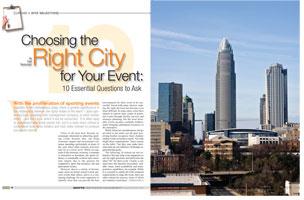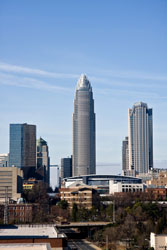
With the proliferation of sporting events available in the marketplace today, there is greater significance in the relationship between the rights holder of the event - sport governing body, privately-held management company, or other similar entity - and the city in which it will be conducted. It is often easy to understand why some events fail, but it is even more critical to understand how rights holders and host cities interact to produce successful events.
 Cities of all sizes have become increasingly interested in attracting sporting events because they can bring economic impact and incremental consumer spending, particularly at times of the year when other tourism activities may be at a lower level. While no segment of the domestic economy is immune to slowdown or downturn, the sports industry is remarkably resilient and consistent, largely due to the passion for competitive sport that produces fan and participant loyalty.
Cities of all sizes have become increasingly interested in attracting sporting events because they can bring economic impact and incremental consumer spending, particularly at times of the year when other tourism activities may be at a lower level. While no segment of the domestic economy is immune to slowdown or downturn, the sports industry is remarkably resilient and consistent, largely due to the passion for competitive sport that produces fan and participant loyalty.
However, due to a variety of factors, some cities are better suited to host specific events than others, and it is a continuing challenge for event organizers to identify cities that can provide the best environment for their event to be successful. Faced with many choices, making the right decision has become even more difficult. In some cases, cities have chosen to narrow their scope of potential events through facility surveys and strategic planning, but the most desirable events produce multiple bidders, some bringing substantial resources to the enterprise.
While financial considerations always are hard to put aside, not all sport governing bodies recognize their championship events as business assets. Not only might these organizations "leave money on the table," but they may make decisions that are not reflective of broader organizational goals.
The following ten criteria are not exhaustive but may help event organizers to ask the right questions and determine the ideal "fit" for their event. Clearly, a city must have the baseline necessities: suitable venue, hotel availability, and transportation capabilities, for example. While it is essential to satisfy all of the technical requirements to stage the event, there are other criteria for success, some of which are routinely overlooked. These elements are revealed by event rights holders asking the ten questions listed below.
Question #1: Why does the city want to host your event? While the most common answer might include economic development, improved city profile, or quality of life enhancement, these reasons focus solely on the benefits derived by the city. If the city understands that a high-quality event depends on a mutually beneficial relationship, then it will understand that it cannot be motivated solely by its own self-interest; instead, it needs to take seriously its role in promoting the sport, creating an optimal environment for the athletes, and delivering measurable return to you as the event rights holder. By asking this question early in the process, you will learn what truly motivates the city. And, by doing so, you will find that some cities do not have a plausible response, or they are not able to look beyond their own internal rationale. If you start by understanding why a city wants to undertake the responsibility of hosting your event, you will find out more than any other question you are likely to ask.
 Question #2: Who will you work with? Law students learn early in their education that "you can't have a good partnership with a bad partner." It is essential that an event organizer examine the track record of the individuals who will be primary to the relationship, as well as the organization that they represent. If they have not delivered on their promises in other contexts or if their business dealings have been less than stellar, it is unlikely that a different result will occur for you. In short, do your homework and don't overlook the danger signals. The people you will work with are vital to your success. A city is likely to be selected several years before the event takes place, and for multi-year relationships to be successful, you need to work with individuals who are worthy of your trust over a long period of time.
Question #2: Who will you work with? Law students learn early in their education that "you can't have a good partnership with a bad partner." It is essential that an event organizer examine the track record of the individuals who will be primary to the relationship, as well as the organization that they represent. If they have not delivered on their promises in other contexts or if their business dealings have been less than stellar, it is unlikely that a different result will occur for you. In short, do your homework and don't overlook the danger signals. The people you will work with are vital to your success. A city is likely to be selected several years before the event takes place, and for multi-year relationships to be successful, you need to work with individuals who are worthy of your trust over a long period of time.
Question #3: What events have they done previously? For some cities, staging excellent events is standard, and each event builds on previous successes. For others, consistent results have been elusive, and they have promised more than they delivered. It is essential to talk with previous event rights holders to better understand whether their performance was equal to their promises. Search past stories in the local newspaper, internal sport organization publications, and other secondary sources to determine whether their past events met rights holder expectations. While some events may have been more successful than others for a variety of reasons, you want to make sure that they have executed their obligations faithfully and have understood the needs of the rights holder. And, the quality of the events that the city has hosted is likely to be more important than quantity, so don't judge experience solely on numbers.
Question #4: Do they have sufficient financial resources to stage the event? Like most business ventures, the primary reason for event failures is under-capitalization. Whether the sources of funding include the public, private, or philanthropic sectors - or some combination of the three - it is important that a city is able to provide a budget that is predictive of success, as well as an understanding of the likelihood of such funding. Danger signals are cities that have an unrealistic budget that demonstrates lack of understanding of event needs, or cities that rely heavily on speculative revenue streams like ticket sales, tax increases, or future political outcomes. Irrespective of the size of your event budget - whether a few thousand dollars or several million dollars - you need to know that vital services and amenities will not be scrapped just before the event because of budget shortfalls.
 Question #5: Is there a local fan base that cares about the sport or the event? Over the years, some cities have developed sizable fan bases for particular sports. When one thinks of Indianapolis, it may evoke images of motor sports; for Baltimore, lacrosse; or, Philadelphia, rowing. These historical associations between cities and sports do not guarantee success, but they certainly make success more likely. Similarly,staging water polo in Cleveland, or track and field in Minneapolis, or figure skating in New Orleans does not mean certain failure either, because sometimes fans can be motivated to experience a new sport or to be attracted by the star quality of athletes in the sport. You must always look for a good "fit," and the propensity for risk must be measured and evaluated.
Question #5: Is there a local fan base that cares about the sport or the event? Over the years, some cities have developed sizable fan bases for particular sports. When one thinks of Indianapolis, it may evoke images of motor sports; for Baltimore, lacrosse; or, Philadelphia, rowing. These historical associations between cities and sports do not guarantee success, but they certainly make success more likely. Similarly,staging water polo in Cleveland, or track and field in Minneapolis, or figure skating in New Orleans does not mean certain failure either, because sometimes fans can be motivated to experience a new sport or to be attracted by the star quality of athletes in the sport. You must always look for a good "fit," and the propensity for risk must be measured and evaluated.
Question #6: Does the city have the requisite technical expertise to stage the event? While many event rights holders bring a cadre of experienced individuals with the technical expertise necessary to conduct the event, it is important to have access to people who have knowledge of the sport, have orchestrated other events at various levels, or who have access to technical resources that can facilitate event success. Their value will be evident at all stages of event planning and organization, and not limited solely to the conduct of the event. Their contacts might be able to provide various resources, particularly equipment needed for venues where athletes might warm up or practice, judging and timing equipment, or other similar amenities. Additionally, their involvement ensures that the organizing committee understands the needs of the athletes, coaches, and officials, and plans accordingly.
Question #7: Does the city have access to volunteers and a track record for effective utilization of them? The value of a volunteer work force is more important today than ever before, and event organizers increasingly understand how critical volunteers are to staging a successful event. Long before the event takes place, however, a local organizing committee comprised of community volunteers provides the necessary framework for the organization of the event and may be divided into various operating units that include, for example, marketing and public relations, participant services, finance, and transportation, reflecting the range of expertise necessary to conduct an event. And, during the event, many of the lasting impressions for visitors will be created by the way in which volunteers carry out their jobs. Cities that have created alliances with nonprofit organizations also have some advantages, particularly in delivering large numbers of volunteers for non-technical responsibilities.
Question #8: Is there unity among the "major players"? In some cities, there is considerable harmony among the local governmental leaders, the venue management team, the convention and visitors bureau, and the sports commission, and when this occurs, the likelihood of success is substantially increased. However, in many cities, this is simply not the case, and internal bickering, rivalries, and political maneuvering can doom even the best events to failure. Sometimes, the internal chemistry is easy to discern and sometimes not. A savvy event organizer needs to ask tough questions and try to understand the extent of collaboration and mutual respect that exists among the key players, and it is likely that if it doesn't exist now, it won't at some point in the future. Don't let yourself get caught up in the internal squabbles and steer clear of the cities that simply don't "have their act together."
 Question #9: How will your event be promoted - before, during, and after? In some cities, the opportunities to promote your event are enhanced by local media who wish to serve as partners, or are generally positive about the event at the time the event is awarded to the city and throughout the entire process through event completion.In other cities, your event may be regarded as an intrusion, a novelty, or a certain failure, any of which may create an environment that is too difficult to overcome. Additionally, some cities have enlisted the assistance of pro bono relationships with advertising agencies and public relations firms that enable you to get maximum exposure and access to high-quality creative talent. And, some potential local corporate sponsors bring significant promotional opportunities, while other companies pay a rights fee and disappear. You should try to ensure that you have all three at work for you in the city you choose: friendly media, excellent relationships for reduced price creative work, and local sponsors who know how to maximize event exposure.
Question #9: How will your event be promoted - before, during, and after? In some cities, the opportunities to promote your event are enhanced by local media who wish to serve as partners, or are generally positive about the event at the time the event is awarded to the city and throughout the entire process through event completion.In other cities, your event may be regarded as an intrusion, a novelty, or a certain failure, any of which may create an environment that is too difficult to overcome. Additionally, some cities have enlisted the assistance of pro bono relationships with advertising agencies and public relations firms that enable you to get maximum exposure and access to high-quality creative talent. And, some potential local corporate sponsors bring significant promotional opportunities, while other companies pay a rights fee and disappear. You should try to ensure that you have all three at work for you in the city you choose: friendly media, excellent relationships for reduced price creative work, and local sponsors who know how to maximize event exposure.
Question #10: What are your goals and how best can you achieve them? If the most important question to ask your potential city partner is why they want to host the event, the most important question an organizer must ask himself/herself is about his/her own goals and the way in which they will be measured. For example, if financial success is the most important end result, make decisions that reflect this. However, if the most important goal is to expand the reach of the sport, or to conduct your event in a new geographic region, or to attract a new sponsorship base, then your decisions will differ according to these criteria. In the end, "know yourself" is the proper mantra, because the "right" city is the one that best can satisfy your needs and help you to achieve your goals. However, many rights holders do not properly evaluate and understand their goals and, thus, are swayed more by financial considerations than strategic opportunities.

